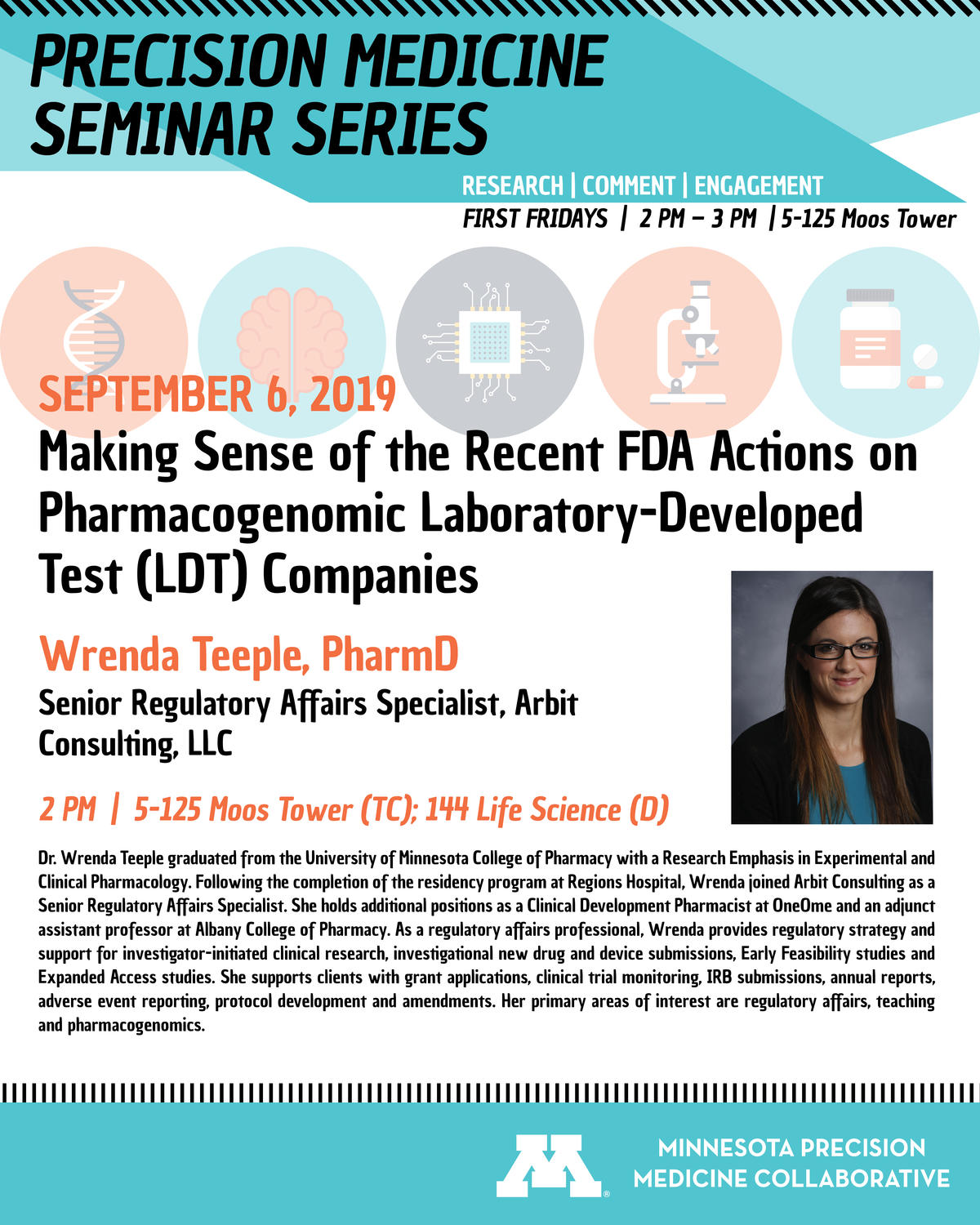Making Sense of the Recent FDA Actions on Pharmacogenomic Laboratory-Developed Test (LDT) Companies
PRECISION MEDICINE SEMINAR SERIES
September 6, 2019 | 2:00 to 3:00 p.m. | 5-125 Moos Tower (TC); 144 Life Science (Duluth)
FDA oversight over laboratory-developed tests (LDTs), specifically recent action with pharmacogenomic tests, has left many laboratories, providers, researchers and regulatory professionals with unanswered questions. FDA has historically exercised enforcement discretion with LDTs given over-lapping regulatory requirements with the Centers for Medicare and Medicaid Services (CMS). Since 2010, FDA has consistently took the stance that it can—and will—hold clinical laboratories to all applicable regulations for in vitro diagnostic medical devices.
In a Safety Communication issued November 1, 2018, FDA publicized the Agency's concern that pharmacogenomic LDTs are overreaching in terms of their clinical interpretation of test results, prompting safety alerts and enforcement action. More recently pharmacogenomic laboratories and companies have received informal communication from FDA that has prompted major changes in service offerings.
Dr. Teeple will describe the history of regulatory oversight over LDTs, discuss the current environment for LDTs and provide high-level guidance for those developing pharmacogenomic LDTs or using LDTs in research or practice.
Dr. Wrenda Teeple graduated from the University of Minnesota College of Pharmacy with a Research Emphasis in Experimental and Clinical Pharmacology. Following the completion of the residency program at Regions Hospital, Wrenda joined Arbit Consulting as a Senior Regulatory Affairs Specialist. She holds additional positions as a Clinical Development Pharmacist at OneOme and an adjunct assistant professor at Albany College of Pharmacy. As a regulatory affairs professional, Wrenda provides regulatory strategy and support for investigator-initiated clinical research, investigational new drug and device submissions, Early Feasibility studies and Expanded Access studies. She supports clients with grant applications, clinical trial monitoring, IRB submissions, annual reports, adverse event reporting, protocol development and amendments. Her primary areas of interest are regulatory affairs, teaching and pharmacogenomics.

In support of improving patient care, University of Minnesota Interprofessional Continuing Education is jointly accredited by the Accreditation Council for Continuing Medical Education (ACCME), the Accreditation Council for Pharmacy Education (ACPE), and the American Nurses Credentialing Center (ANCC) to provide continuing education for the healthcare team.
CREDIT DESIGNATION STATEMENTS:
American Nurses Credentialing Center (ANCC) — This activity is awarded up to 1 ANCC contact hour. Nurses should claim only the credit commensurate with the extent of their participation in the activity.
American Medical Association (AMA) — The University of Minnesota Interprofessional Continuing Education designates this live activity for a maximum of 1 AMA PRA Category 1 Credits™. Physicians should claim only the credit commensurate with the extent of their participation in the activity.
Accreditation Council for Pharmacy Education — The Universal Activity Number is JA0000810-0000-20-028-H04-P. This knowledge-based activity has been approved for 1 contact hour.
Other Health Professionals — It is the responsibility of each participant to determine if the program meets the criteria for re-licensure or re-certification for their discipline.
